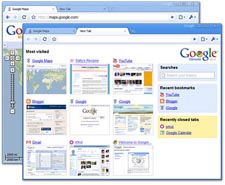Chrome was inevitable: Mozilla CEO

update Mozilla CEO John Lilly today waxed philosophical about the release of Google's new Web browser, Chrome, despite it signalling an attempt by the search giant (Mozilla's major financier) to become its biggest competitor.
Chrome, Lilly says, was inevitable.
"It should come as no real surprise that Google has done something here: their business is the Web, and they've got clear opinions on how things should be," Lilly wrote in his blog today. "Chrome will be a browser optimised for the things that they see as important."
The beta version of Chrome, to be available later today (Sydney time) for Windows systems, is an obvious alternative to Firefox for those Web surfers fed up with Microsoft's long-reigning Internet Explorer browser.
Mozilla and Google have had a long and very fruitful relationship. Google is the default search engine on the Mozilla Firefox browser, and pays Mozilla large sums for the privilege: US$56 million of the US$66 million Mozilla Corporation made in 2006.
But Mozilla CEO John Lilly, writing in his blog, said he welcomed the competition posed by Google. Lilly said Mozilla would continue its financial relationship with Google until 2011 and would continue to work with the search giant on technical collaborations such as crash reports system Breakpad.
Paul Kim, vice president of marketing for Mozilla, said that Google staff would be allowed to continue to contribute to the Mozilla Foundation's projects. "As a 100 per cent open source project, we welcome contributions to Firefox from everyone," he said.
"More smart people thinking about ways to make the Web good for normal human beings is good, absolutely," Lilly said.
"Competition often results in innovation of one sort or another: in the browser you can see that this is true in spades this year, with huge Javascript performance increases, security process advances, and user interface breakthroughs. I'd expect that to continue now that Google has thrown their hat in the ring."
